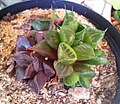
Haworthia is a large genus of small succulent plants endemic to Southern Africa (Mozambique, Namibia, Lesotho, Eswatini and South Africa).

Haworthia cymbiformis is a species of the genus Haworthia in the family Asphodelaceae, endemic to the Eastern Cape Province in South Africa.

Haworthiopsis coarctata, formerly Haworthia coarctata, is a species of flowering succulent plant from the Eastern Cape Province, South Africa and naturalized in Mexico. It is one of the species of Haworthiopsis that is commonly cultivated as an ornamental.

Haworthia truncata, locally known as horse's teeth, is a species of succulent plant in the genus Haworthia. It is found in the Little Karoo region, in the far east of the Western Cape Province, South Africa.

Haworthia magnifica is a species of the genus Haworthia belonging to the family Asphodelaceae.

Haworthia bolusii is a species of Haworthia that was originally described by John Gilbert Baker in 1880.

Haworthia cooperi is a diverse and varied species of the genus Haworthia in the family Asphodelaceae, endemic to the Eastern Cape Province in South Africa.
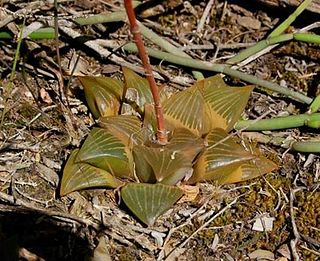
Haworthia retusa is a species of flowering plants of the genus Haworthia in the family Asphodelaceae, endemic to a very small area around Riversdale, in the Western Cape Province in South Africa. Growing to 10 cm (3.9 in) tall and broad, it is a perennial succulent with thick triangular leaves and small white tubular flowers held in 50 cm (20 in) tall racemes.

Haworthia emelyae is a species of the genus Haworthia in the family Asphodelaceae, endemic to the Western Cape Province in South Africa.

Haworthia pygmaea is a species of the genus Haworthia in the family Asphodelaceae, endemic to the Mossel Bay area of the Western Cape, South Africa.
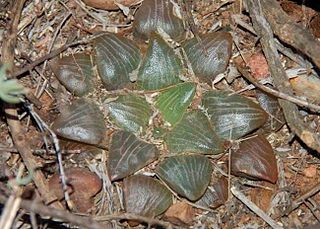
Haworthia bayeri is a species of the genus Haworthia in the family Asphodelaceae, endemic to the southern Cape Provinces in South Africa.
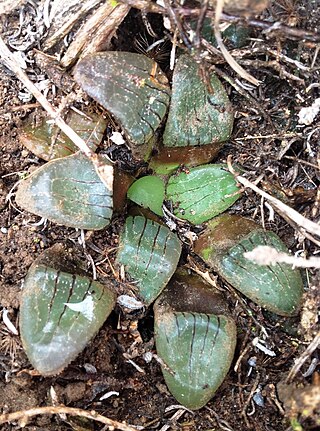
Haworthia springbokvlakensis is a species of the genus Haworthia in the family Asphodelaceae, endemic to a very restricted area of the Eastern Cape Province in South Africa.

Haworthiopsis scabra, formerly Haworthia scabra, is a species of flowering succulent plant from arid regions of the Western and Eastern Cape Provinces, South Africa.
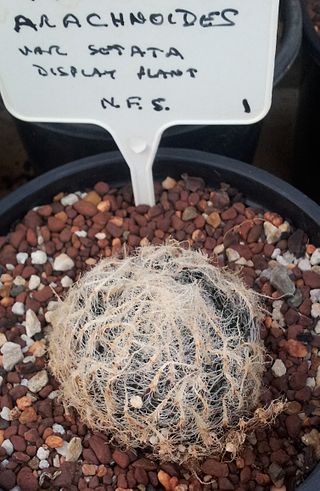
Haworthia arachnoidea, locally known as "papierrosie" (paper-rose) or "spinnekopnes" (spider-nest), is the type species of the genus Haworthia, in the family Asphodelaceae, in the Western Cape Province of South Africa.
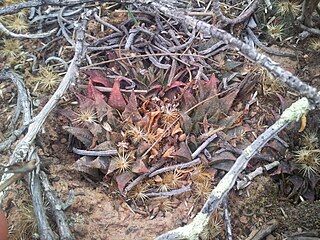
Haworthia maraisii is a species of flowering plant in the family Asphodeloideae, found in the southwest Cape Provinces of South Africa. It has been treated as a variety of either Haworthia magnifica or Haworthia mirabilis, but is accepted as a full species in the World Checklist of Selected Plant Families.

Haworthia turgida, also sometimes known as the windowpane plant, is a species of Haworthia native to the Cape Provinces. Its common name comes from the translucent panes on its leaves, which are similar to those of Haworthia cooperi and some other species in the genus. It grows in dense clusters of offsets from the base, and in its native habitat prefers rocky limestone or slate cliffs. The main type has pale green leaves but varies widely. Varieties include Haworthia turgida var. longibracteata (M.B.Bayer) and Haworthia turgida var. suberecta (Poelln.)
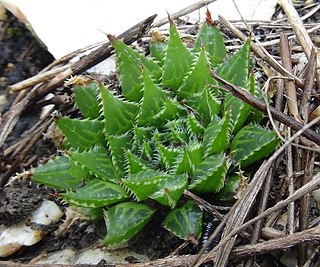
Haworthia rossouwii is a species of succulent plant belonging to the genus Haworthia and is classified under the family Asphodelaceae. It is native to Southern Africa, in the Overberg region of the Western Cape Province.

Haworthia reticulata is a species of succulent plant native to the southwestern Cape Provinces of South Africa. The species has several varieties, including var. hurlingii which is the smallest at up to 1 inch (2.5 cm) wide.
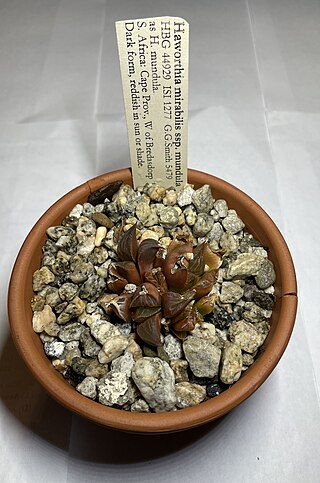
Haworthia mirabilis var. mundula is a variety of Haworthia mirabilis merged in 2012. It was originally Haworthia mundula.









